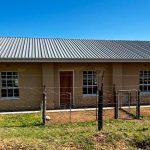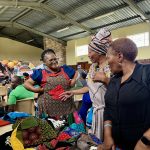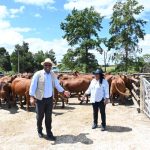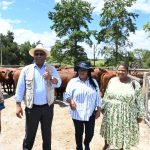
by Olwetu Batyi | May 6, 2024 | Uncategorized
UMphathiswa weSebe loPhuhliso lwamaPhandle noLimo uNonkqubela Pieters uthe wanikezela ngokusesikweni ishedi ye Sophumelela eBacclesfarm eNtabethemba. Le project inamalungu ayi 34 nanomhlambi weegusha eziyi1813 ezivelisa amabhali ayi26.

Le shedi inezixhobo zokusebenza, idiphu yeegusha eyakuthi iphuhlise izinga loboya nengeniso kwezoqoqosho. Umphathiswa weZemidlalo, ubuGcisa neNkcubeko uKhontsiwe ube yinxalenye yale mibhiyozo.
Usihlalo mafama uMnu uNgwevela ubengawuvali umlomo evuyiswa sesi sipho sisuka kuRhulumente .
by Olwetu Batyi | Apr 4, 2024 | Uncategorized
Mabuyane happy with Kuwait export of live animals, safety measures in place for the shipment
The Premier of the Eastern Cape province, Lubabalo Oscar Mabuyane and the President of the Agri Eastern Cape, Pieter Cloete said they are pleased with step taken by stakeholders to ensure safety of animals being boarded into a vessel to transport them to Kuwait as part of the trade agreement facilitated by the provincial government with the agency of Kuwait government.
Mabuyane and Cloete, together with the Eastern Cape Rural Development and Agrarian Reform MEC, Nonkqubela Pieters visited the vessels that is loading 56000 sheep, 200 goats and 1500 cattle at the Port of East London.
He said the export of livestock to Kuwait from the Eastern Cape means a lot for the province in terms of growing the provincial economy as the provincial government has identified both primary agriculture and agro processing as one of potential sectors for growth and as the niche sector for the province.
“So we are looking broadly on that and this is one of those practical steps we are making to ensure that we benefit out of globalisation, so we are part of this globe. So we are looking at the broader value addition of this and the value chain beneficiation, how to bring subsistence farmers on board. You understand that government has been investing a lot in terms of livestock improvement, particularly looking at the meat and the wool production . We are quite happy with the work that is happening. This transaction alone is more than R200 million investment into this and more than R1.2 billion has been put into this. This is the sixth installment of this loading that you are seeing here and this is taking us somewhere,” said Mabuyane.
Happy with the Kuwait export market, Mabuyane said the province has a lot of livestock, which will also help improve and increase breeding and production of livestock to maintain the superior quality of meat produced by the province from genetics point of view compared to other provinces.
He said while there are other Middle East countries talking to the province about similar trade deals that will include livestock and many other agricultural products, the provincial government wants to ensure local beneficiation.
“I know Saudi Arabia is knocking at our doors. We are also looking more in expanding and diversifying this approach where we are able to do more from the production side of meat so that we retain jobs and get more byproduct out of the skins of animals. These are things that we are looking at. This is a partnership arrangement between Kuwait and business people from this side facilitated by the government of the Eastern Cape. You will understand that Al Mawashi made this pronouncement in one of those presidential investment summit that they will be investing about R2 billion for this. So it is coming together slowly but surely, so today we thought that let’s come and see it for ourselves,” said Mabuyane.
In response to complaints about animal welfare, Mabuyane said: “There has been a lot of hullabaloo, complaints about this or that out there. We are quite happy with how everything is being handled here, its quality up to standard, animals are looked after, animals are happy. We were moving around the ship, they are eating as we speak, they are moving, they have got space, they are drinking. So if they were under stress, they would not be doing that surely. So we are quite happy with the work that has been done and the quality of work that is being put into this.”
He encouraged commercial farmers to embrace previously disadvantaged farmers to be on board in terms of supplying animals to the feedlot so that this becomes the revolution on its own in getting everyone and making agriculture fashionable.
Cloete said it was vital to understand the spinoffs in the province that come from this export and likened it to the motor industry, saying some people see a car and think its only a Motor car but there is a tyre industry, there is upholstery industry and everything that goes with it.
“With this we are really going to work hard to try and lift genetics with the emerging farmers because that is where the numbers are as you all know the Eastern Cape has got the highest number of livestock of all the provinces in this country. So it is of vital importance that we get this industry to keep it going,” said Cloete.
He said: “We are happy today. We came here to see the loading of sheep into the vessel. It is beautiful inside there, they are being well fed, some are resting and there is no problem. Some people are complaining that they are being ill-treated but you can also check for yourself, that place looks like a hotel and there is nothing wrong there. It’s beautiful in here. No doubt, the animals are looked after and this is a floating feedlot and nothing else.”

For the current shipment of animals R177 228 000 was paid to purchase animals from farmers, R17 960 000 was spent on purchasing feed for the animals, R1 200 000 having paid as salaries for temporary jobs flowing from the preparation of the export of these animals, R3 334 87 paid to the East London Port, R1 695 00 used to purchase animal vaccines and veterinary supplies for all animals being transported, R10 220 000 injected into the transportation of animals

by Olwetu Batyi | Mar 5, 2024 | Uncategorized
Seamstresses ready to expand businesses with new industrial sewing machines

A group of Sarah Bartman Seamstress who got brand new industrial sewing machines and overlockers from the Eastern Cape Department of Rural Development and Agrarian Reform MEC Nonkqubela Pieters on Monday, 4 March, said they are ready to expand their textile production businesses.
With each of the 16 businesses in the Sarah Baartman District receiving an industrial size sewing machine with an overlocker machine, some of the women who took ownership of their machines said they were over the moon with the injection from the provincial government.
Vuyiswa Nobebe, a Seamstress from Bathurst who started sewing clothes in her thirties, said the new machines will boost her business as she will now be able to increase the number of clothing items she produces for her clients.
“These new machines took my life out of the muddy waters that was my business with old machines. It is like I am being born again because I have been struggling for a long time, now this has changed my life. When I started, I used a hand operated singer machine, I did odd sewing jobs here and there, including learning more sewing skills and about managing a sewing business,” she said.
Nobebe said when she did not have an overlocker machine her clothing items fetched low prices from buyers because they had untidy hem but all this is thrown into the past as her new overlocker machine will produce clean, beautiful and tidy hems for the clothes she makes.
Nombebe said her business, Masincedane project produces diverse church uniforms, trendy imibhaco and other women traditional clothing popular for imigidi, imitshato (wedding ceremonies) and other traditional ceremonies. She said with these new machines she will make more money as she plans to sell more clothing, including school uniforms and invest some of the revenue into her business.
Her colleague, Buysiwa Voyiza, a Grahams Town based Seamstress and owner of Noziqhamo cooperative said she was very excited when she got the new machines because now, she will be able to produce her client’s clothing on time because the machines are faster than her old machine.
“I am very excited. I will now be able to complete my client’s clothing on time. My busiest time is ahead of the Easter weekend as scores of church members order new uniforms, other buyers place order for traditional ceremonies,” said Voyiza, adding that the busiest time for her business was June and December as clients are gearing up for Imigidi.
Voyiza said she struggled for 20 years using low capacity and common machines she bought from retail stores that broke easily. She said with the new machines she will be able to produce any clothing and textile item, especially curtains for her clients.
Speaking during the handover in Bathurst, Pieters said government was hoping that the machines handed over to the small business owners will change their lives to be better.
“We want you to use these machines to make income for yourselves so that you eradicate poverty in your families. Don’t use these machines as surety to loan sharks. Don’t make clothes for clients who don’t pay deposit upfront. They must pay 50% deposit upfront and other 50% on delivery because if you don’t, you will not make money because some people ask you to make clothes for them but they don’t fetch their clothes and don’t pay you your money while you have spent your own money buying material and time producing these clothes,” said Pieters.
She said when people pay 50% deposit for their clothes, they commit to complete payment but if they don’t pay deposit, they don’t care whether they fetch it or not. Pieters urged the small enterprises to be tough business people for them to make money from their businesses because they are running businesses.
“Don’t be compassionate with your business. You don’t get your sewing material free of charge. You pay for it. So, your clients must pay 50% before you stock material for their clothing. Farmers don’t sell their produce the way you do. You pay for livestock when you collet or before collection. Stop being mother Christmas,” said Pieters.
Pieters said there are many development programmes being rolled out by the department throughout the Eastern Cape province and encouraged everyone interested to submit applications for support.
She said the Department has purchased 206 industrial sewing machines and overlockers for 103 cooperatives in the province benefiting 89 youth, 30 people living with disabilities, 283 adult females. From this list, 13 cooperatives are in the Alfred Nzo, 27 in Amathole, 13 in Chris Hani, 15 in Joe Gqabi, 19 in the OR Tambo, 16 in Sarah Baartman district.

by Olwetu Batyi | Feb 22, 2024 | Uncategorized

Ngamakhaya ayi-281 kunye nesikolo esizakuxhamla kwimpompo zamanzi eziyi-40 ezifakelwe apha.
Kunyaka-mali ka2022/23, siye safakela amanzi kwindawo ezisibhozo (8) koomasipala i-Emalahleni, Dr AB Xuma, Intsika Yethu, Elundini, Raymond Mhlaba, Ntabankulu, Mhlontlo kunye ne-King Sabatha Dalindyebo
Eli phulo lwenze kwafakelwa iimpompo zamanzi eziyi-252 kwaxhamla amakhaya ayi-2 612 kuquka ne-kliniki, izikolo ezintathu kunye necawe ezintantu. Amaththuba emisebenzi eyi-471 aye avela .
Isebe liqinisekisa ukuba ukufakelwa kwala manzi kuyanyaniswa nokuvelisa ukutya
Kulo nyaka-mali ka-2023/24 isebe belibekele bucala izigidi ezingaphezulu kwesihlanu ( R5.3 million) ukufakela amanzi kwindawo ezimbini kumasipala i-Amathole, embini e-Alfred Nzo, ezintathu eChris Hani, ze ibenye e-Joe Gqabi nase-OR Tambo

by Olwetu Batyi | Feb 22, 2024 | Uncategorized

Here is the caption. EASTERN Cape Premier Lubabalo Oscar Mabuyane together with the MEC for Rural Development and Agrarian Reform (DRDAR) Nonkqubela Pieters handed over quality breed cattle and goats to the province’s small-holder and communal farmers as part of ongoing livestock production benefiting. Between 2009/2010 and 2022/23 financial years the department distributed 9 233 cattle, goats and sheep with superior genetic to 1 441 farmers across the Eastern Cape Province while R12.8 million is being spent to purchase 250 cattle, 500 sheep and 200 goats to enhance redmeat and animal fiber development in the Province. Picture: Mandla Nduna/ECOTP


by Olwetu Batyi | Aug 21, 2023 | Uncategorized

YOUNG MTHATHA FARMER WINS TOP PRIZE AT WOMEN IN AGRICULTURE AWARDS
Issued by the DRDAR Communication and Customer Care Services on 17 August 2023
It took 28-year-old King Sabata Dalindyebo based farmer Siphesihle Kwetana under five years to start a farming enterprise and turn it into a successful business.
Kwetana is one of the most successful farmers in the OR Tambo District and arguably, the province. Today, she made off with top honours at the Eastern Cape Department of Rural Development and Agrarian Reform’s Women Entrepreneur Awards held in Qumbu.
The awards are meant to recognise women who are involved in various capacities in the agricultural sector with awards that include prize money from subsistence to commercial level categories.
Kwetana beat other competitors in the Commercial Category and won first prize and not only that, but she also made off with the provincial overall prize. This sets her apart from the rest and will give her a competitive edge in the national leg of the awards to be held in the Free State Province.
An ecstatic Kwetana said she would use her R320 000 winnings to help her construct a dam where she plans to start an aquaculture project.
“The prize money will be used for staff salaries, assist in buying equipment for a butchery that I have built at KwaKaplan Village and also assist in the aquaculture project that I am going to be embarking on. Right now I am still doing research on the popular fish species so that I can proceed with fish farming,” she said.
Kwetana runs an agricultural enterprise in Mthatha where she has a piggery, poultry, vegetable and also sells seedlings. Kwetana, 28, sells her produce at food retail stores like Spar and Pick ‘n Pay. The confident young farmer said she is looking forward to competing in the national competition which will be held in August.
In her category, Kwetana beat livestock producer Sinovuyo Nzukuma who is running a thriving farm in the Chris Hani District. Nzukuma’s farm has more than 100 cattle. She was assisted by the Department with fencing, genetically superior cattle and a borehole.
For the MEC Special Award, Kholiswa Dabula, a partially blind farmer who survived a gruesome attach in Cape Town which left her eyes damaged won the MEC Special Award – Disability. Dabula was a bus driver in the Western Cape when her family was attacked by a bunch of thugs who left her for dead. Little did they know that their actions would propel Dabula to greater heights.
Dabula said she had lost all hope when she became partially blind after the attack. A bus driver then in Cape Town, Dabula had to abruptly end her stay in the seaside city after the attack and return home to the Eastern Cape to start over.
Despite being partially blind, Dabula did not let her sudden disability stand in her way, she started planting spinach in her backyard and would sell when she had surplus.
MEC Nonkqubela Pieters said the department was committed to supporting women farers and priorities and “fund the nominees that participated in the Women Entrepreneur Awards at district level of this current financial year.
She added that the department will support the nominees with production, infrastructure and through livestock improvement schemes.
The following categories were awarded today:
MEC Special Award – Youth
Runner-up: Cebokazi Galashe– R25 000 Winner: Neziswa Mlenzana – R50 000
MEC Special Award – Woman with Disability
Runner-up: Nowangile Jolwana – R25 000 Winner: Kholiswa Dabula – R50 000
Best Female Worker
Runner-up Linda Mgedezi – R25 000 Winner: Akhumzi Mkhontwana – R50 000
Best Subsistence Producer
Runner-up: Nomfesane Tshekela – R50 000 Winner: Nomalizo Mafanga – R75 000
Best Smallholder Producer
Runner-up: Tobela Mapukata – R80 000 Winner: Nontuthuzelo Mbebe – R120 000
Best Agro-Processor
Winner: Tuliswa Mondliwa – R80 000 Winner: Nokuzola James – R120 000
Best Commercial Producer
Runner-up: Sinovuyo Nzukuma – R80 000 Winner: Siphesihle Kwetana – R120 000
Overall Winner – Siphesihle Kwetana – R200 000












